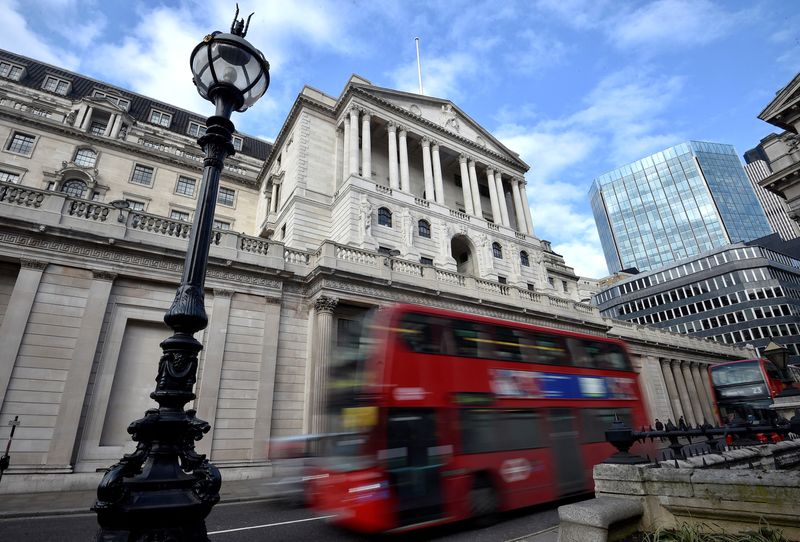Select Language

By William Schomberg
LONDON (Reuters) - The Bank of England looks set to hold borrowing costs at a 15-year high on Thursday and signal that it does not plan to cut them anytime soon as it remains locked in a battle against the most elevated inflation rate among the world's rich economies.
Despite strain in the economy that some see as a sign of a recession starting, the BoE is expected to keep Bank Rate at 5.25% for a second meeting in a row after 14 back-to-back increases, a Reuters poll of economists showed last week.
Last week the European Central Bank kept rates unchanged and the U.S. Federal Reserve did the same on Wednesday as they wait to see if the worst inflation outbreak in decades has really been quelled.
The BoE's Monetary Policy Committee is facing an inflation rate more than double that of the euro zone and almost twice the U.S. rate. It voted by only a narrow 5-4 margin in September to halt its run of increases in borrowing costs.
But signs of a slowdown in much of the British economy have become clearer since then and some economists say a recession might already be under way.
Mike Riddell, a senior portfolio manager at Allianz (ETR:ALVG) Global Investors, said the long lags between changes in rates and their impact meant most of the BoE's increases in borrowing costs between late 2021 and August this year was yet to be felt.
"The BoE will most likely therefore be keen to keep all options open, but seems set to wait and observe how much pain the previous hikes have caused before changing rates again in either direction," Riddell said.
SLOW FALL OF INFLATION
BoE Governor Andrew Bailey and other top officials at the central bank have acknowledged that their rate hikes to date are weighing on the economy. But they have also stressed they will not flinch in their task of bringing inflation down.
The BoE - which some economists and politicians criticised for not sounding aggressive enough about quashing the surge in prices early on - has said it is determined to stamp out the long-term inflation risks to the economy, chief among them strong rises in pay growth.
Although inflation has fallen from 11.1% just over a year ago to 6.7% in the most recent data, it remains more than three times the BoE's 2% target.
The central bank said in its last set of economic forecasts in August that inflation would only return to 2% in the second quarter of 2025.
Inflation is expected to resume its fall in October after stalling in September but rising oil and gas prices since the start of the turmoil in the Middle East could slow its fall.
The BoE will publish new forecasts on Thursday.
Most investors believe it is now done with rate hikes and will keep borrowing costs on hold until at least August next year before starting to cut them.
But Bailey and his MPC colleagues are likely to reiterate that they are ready to raise rates higher if needed.
As well the data, the BoE is keeping an eye on political news: Prime Minister Rishi Sunak is under pressure from within his Conservative Party to cut taxes ahead of a national election expected next year.
Sunak and his finance minister Jeremy Hunt have said they cannot offer major sweeteners to voters in a budget update on Nov. 22, given the need to focus on bringing down inflation. Sunak pledged in January to halve inflation this year.
But Hunt is likely to have one more budget statement to deliver in the spring of next year before the election.

